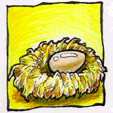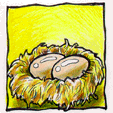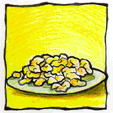| Countable and uncountable nouns |
Consider the use of egg/s in the following examples from a recipe:
Take 4 eggs and separate the yolks from the whites ... [countable] ... Beat until the egg and sugar are completely mixed. [uncountable]
In the first example, the countable form is used to refer to the eggs as individual items. In the second example, the uncountable form is used to refer to the beaten egg as a substance:
an egg |
two eggs |
egg |
 |
 |
 |
countable |
uncountable |
|
There are many nouns which behave in this way, often related to
food, (beer, chocolate, coffee, cheese, sugar). These nouns are sometimes used as
countable and sometimes used as uncountable, although with a difference in meaning. When
introducing such words to students, it may be useful to show pictures which clearly
illustrate the different uses of the word. ![]()
Abstract nouns
Abstract nouns refer to non-physical things which you cannot touch (like happiness, memory) and are distinguished from concrete nouns (like book, table) which can be touched. Abstract nouns are occasionally countable (worries, mistakes), but more commonly uncountable (happiness, music).
Primary level students will find abstract nouns more difficult to understand and to learn since they refer to ideas, concepts, feelings and non-physical things which we cannot directly perceive with our senses.
Nouns which are derived from verbs with the form verb + -ing (shopping, eating) are typically uncountable; however, they are occasionally countable (earnings, buildings).
Some countable nouns may be used as uncountables under certain
conditions, namely when making a general statement about the entity we are referring to,
eg The cat is a great opportunist (where cat refers to all creatures
belonging to the species 'cat').
Nouns in English can be divided into groups according to how countable they are. These
groups can be placed on a scale:
| What a beautiful baby! |
Don't play with fire. We lit a fire to keep warm. |
I need some advice. |
| always countable | always uncountable | |
|
Tell me more ... Introduction |
|
||
To give us feedback about this section, click here or on the Comment button at the top of the screen.
If you have any questions about this section, visit the Language Corner.
If you have any questions or suggestions about how to teach this section, send a message to the Teaching Corner.